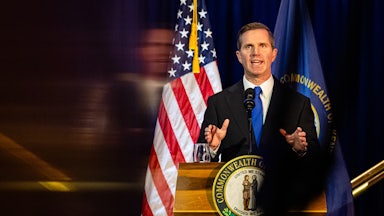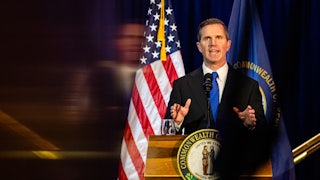There are two types of news articles that, whether they
intend to or not, always end up painting Donald Trump’s supporters in a
sympathetic light. One type of story usually points to “economic anxiety” as a
reason why “average Americans” would support someone as awful as Trump (despite
all the data proving this isn’t true).
Another tends to describe his supporters as regular people who have fallen down a rabbit hole of kooky ideas and conspiracy theories peddled by malign actors. One notable recent example of this was written by McKay Coppins for The Atlantic, who urged readers to go to a Trump rally to see what MAGA looks like today.
Both genres, interestingly, show the people as passive vessels being acted upon. They fail to give agency to the people supporting a man who openly promises a dictatorship: a man who vows, “I am your retribution.”
This sort of journalism is harmful in so many ways. It’s an extension of the “Ohio man in a diner” cliché that treats Trump supporters as salt of the earth, real Americans, while implying that people who live in cities or have college degrees are not. This directly contributes to the “herrenvolk democracy” narrative, where only specific groups of people (namely white, rural, conservative Christian) should have a say in government, or at least they have a somehow more legitimate stake in it. In effect, this sort of journalism buys into one of the central narratives of fascism (herrenvolk versus elites), then sells it to an unwitting public.
Barack Obama correctly observed in 2016, “It did not start with Donald Trump; he is the symptom, not the cause.” Trump simply exploited what people were already feeling—feelings that, according to the data, are rooted in authoritarianism, racism, and social dominance orientation. He was always about a “vibe,” and that vibe was to hurt the people his audience thought should be hurt. The greatest failing of such reporting is that both the “guy in the diner” and the “person at the rally” interviews show reporters surprised at how perfectly normal the people seem in person. As Coppins noted in his article: “I found the wholesome, church-barbecue vibe a little jarring.”
This misses the forest for the trees. As a young man, abolitionist John Brown was hosted by a slave owner for dinner. The host seemed perfectly charming until he nearly beat an enslaved boy to death in front of Brown for being too slow. Frederick Douglass observed, “The man who wields the blood-clotted cowskin during the week fills the pulpit on Sunday, and claims to be a minister of the meek and lowly Jesus.” Milton Mayer, a Jewish American author, journalist, and educator, was surprised by how perfectly normal and cordial former Nazis were when he visited the shattered country in the early 1950s. Hannah Arendt coined the term “banality of evil” to describe how unremarkable Adolf Eichmann was at his trial, and how Eichmann replaced coherent thought with “stock phrases and self-invented clichés.” (Sound familiar?)
What these reporters (who are largely white and male) seem to forget is that these people seem friendly toward them because they are not members of groups that the GOP rank and file think should be “eradicated.” Similarly, John Brown’s initial impression of his host would have been a lot different if Brown weren’t white. I would likely have a very bad time at a Trump rally if people recognized me as trans (and I’m not particularly willing to go along with the eradication order).
Mayer’s book They Thought They Were Free: The Germans 1933-1945 had a profound impact on me when I read it because it was all so familiar. Mayer visited the homes of German Nazis after the war, who were all rather ordinary people. He wanted to understand why nice, average, middle-class Germans could have supported Hitler and all that came with him. These German men were all extremely polite and served him the best food and drink they had in a country that was still economically devastated by the war.
When Mayer asked about the Holocaust, however, things took a dark turn. How it could happen snapped into sharp focus. These perfectly pleasant Germans said they knew nothing about it. Or that it didn’t happen. Or it did happen, but it was exaggerated. Or, if they did acknowledge that it happened, well, sure, Hitler went too far, but the Jews had done a lot to bring it on themselves.
Which brings me to the present, and my Latter-Day Saint, Trump-voting father. When I told him that one of Trump’s first actions as president would be to kick me out of the National Guard, he refused to believe it. I showed him the clips of him promising to do just that on the campaign trail and reminded him of the 2017 ban. He still wouldn’t accept the obvious, because “the military can’t recruit enough people as it is. No way they start kicking people out.” He could not bring himself to believe that his vote would directly impact his own family members enough to change his mind, even when presented with incontrovertible evidence, because it might cause a real “Are we the baddies?” moment.
At the same time, supposed moderate apologists for fascism like Jordan Peterson and Joe Rogan observe that what’s happening to trans people might go a little too far but that they brought it on themselves and the rise of fascism is a completely understandable response. While conservatives are calling for “the eradication of transgenderism,” I see people aligned with the GOP engaging in the same sorts of mental gymnastics that Milton Mayer’s postwar Nazis did.
Thus the important takeaway from these articles is not relief that Trump has gotten stale. It confirms the other evidence that there is a strong, underlying desire for an authoritarian fascist to rule the country and that even those who aren’t true believers would simply go along with it, or disbelieve it altogether. These perfectly nice, ordinary, generous, pleasant people are no different from any German in 1933–1945.
Arendt also noted how part of the allure of fascism is its invitation to “throw off the mask of hypocrisy.” Trump was merely the invitation. He was an outlet for an unspoken desire to seize control and remake the nation, hurting the people who needed it along the way. One of my takeaways from these articles highlighting bored rallygoers is: Many of the people in the front row aren’t fired-up true believers. They are there for the ideology and the outcome, not for the man. They’re OK with the fascism, even if the schtick got old. In the end, the worst movements are always quietly enabled by otherwise ordinary men.






